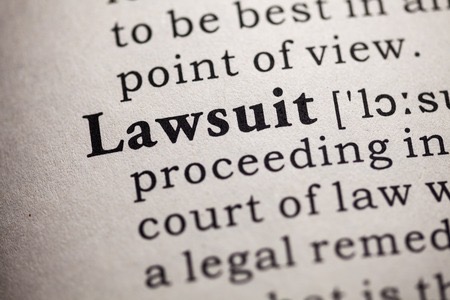 On Wednesday, July 18th, legal data analytics firm Lex Machina announced the release of its first ever Trade Secret Litigation Report. The report encapsulates data sets and trend highlights occurring over a nine-year period from more than 9,800 cases brought under state trade secret laws and the federal Defend Trade Secrets Act (DTSA) of 2016.
On Wednesday, July 18th, legal data analytics firm Lex Machina announced the release of its first ever Trade Secret Litigation Report. The report encapsulates data sets and trend highlights occurring over a nine-year period from more than 9,800 cases brought under state trade secret laws and the federal Defend Trade Secrets Act (DTSA) of 2016.
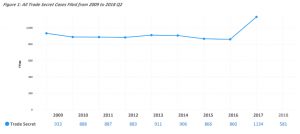 The Lex Machina report supports the notion that trade secret litigation has ramped up in U.S. district courts in the time since the passage of the DTSA. Between 2009 and 2016, trade secret suit filings generally remained within a range of 860 cases per year and 930 cases per year. In 2017, however, U.S. trade secret case filings saw an increase up to 1,134 cases filed. Through the first half of 2018, 581 trade secret cases have been filed, putting this year on pace to slightly exceed the number of trade secret cases filed in 2017.
The Lex Machina report supports the notion that trade secret litigation has ramped up in U.S. district courts in the time since the passage of the DTSA. Between 2009 and 2016, trade secret suit filings generally remained within a range of 860 cases per year and 930 cases per year. In 2017, however, U.S. trade secret case filings saw an increase up to 1,134 cases filed. Through the first half of 2018, 581 trade secret cases have been filed, putting this year on pace to slightly exceed the number of trade secret cases filed in 2017.
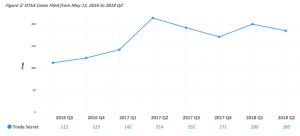 Although the DTSA was enacted in May 2016, it wasn’t until the second quarter of 2017 that trade secret suits crested to their high point of 214 cases in that quarter. According to Rachel Bailey, a legal data expert with Lex Machina, this lapse between the enactment of DTSA and the high-point of trade secret filings could represent a period of time in which lawyers were trying to understand their options with the new federal law. “The DTSA is very similar to the Uniform Trade Secrets Act, which allows parties to file trade secret claims in state court,” Bailey said. “It’s likely a period of time in which lawyers were negotiating whether to file claims in state court or in federal district court. In a lot of states, parties can file a very similar trade secret claim in state court.”
Although the DTSA was enacted in May 2016, it wasn’t until the second quarter of 2017 that trade secret suits crested to their high point of 214 cases in that quarter. According to Rachel Bailey, a legal data expert with Lex Machina, this lapse between the enactment of DTSA and the high-point of trade secret filings could represent a period of time in which lawyers were trying to understand their options with the new federal law. “The DTSA is very similar to the Uniform Trade Secrets Act, which allows parties to file trade secret claims in state court,” Bailey said. “It’s likely a period of time in which lawyers were negotiating whether to file claims in state court or in federal district court. In a lot of states, parties can file a very similar trade secret claim in state court.”
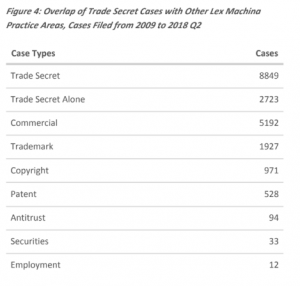 Lawsuits that involve trade secret claims tend to overlap heavily with other claims, especially commercial claims such as breach of contract or business tort. Of the 8,849 trade secret cases filed between 2009 and the second quarter of 2018, a total of 2,723 cases involved trade secret claims alone. A total of 5,192 cases involved trade secret claims which overlapped with commercial claims, representing about 60 percent of all trade secret cases. “Because trade secrets are of course secret, they do not have a registration like other forms of intellectual property. They may be protected by contracts,” Bailey said. “Trade secret cases could also involve some other confidential information that doesn’t rise to the level of trade secret and that’s what we might be seeing in that overlap.”
Lawsuits that involve trade secret claims tend to overlap heavily with other claims, especially commercial claims such as breach of contract or business tort. Of the 8,849 trade secret cases filed between 2009 and the second quarter of 2018, a total of 2,723 cases involved trade secret claims alone. A total of 5,192 cases involved trade secret claims which overlapped with commercial claims, representing about 60 percent of all trade secret cases. “Because trade secrets are of course secret, they do not have a registration like other forms of intellectual property. They may be protected by contracts,” Bailey said. “Trade secret cases could also involve some other confidential information that doesn’t rise to the level of trade secret and that’s what we might be seeing in that overlap.”
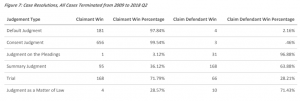 The most common type of case resolution for trade secret cases terminating during the study period was through a consent judgment, accounting for a total of 659 trade secret cases terminating. The overwhelming majority of those cases (656 cases, or 99.54 percent) resulted in claimant wins. “In reviewing these cases, there’s a very common fact pattern that plays out where the company is the claimant and the defendant is an employee who has left the company,” Bailey said. “It may be some indication of an imbalance where a consent judgment may be in the former employee’s best interest as an easy way to get out of litigation.” Claim defendants in trade secret cases tended to do much better at the summary judgment phase where defendants prevail in nearly 64 percent of cases. Claimants that go to the trial phase, however, wind up succeeding in just over 70 percent of cases. “The summary judgment phase is most interesting to me,” Bailey said. “At that stage, there are a lot of ways to prove that there’s no trade secret protection where the defendant can say that the claimant didn’t maintain secrecy or the trade secret was generally known or readily ascertainable.”
The most common type of case resolution for trade secret cases terminating during the study period was through a consent judgment, accounting for a total of 659 trade secret cases terminating. The overwhelming majority of those cases (656 cases, or 99.54 percent) resulted in claimant wins. “In reviewing these cases, there’s a very common fact pattern that plays out where the company is the claimant and the defendant is an employee who has left the company,” Bailey said. “It may be some indication of an imbalance where a consent judgment may be in the former employee’s best interest as an easy way to get out of litigation.” Claim defendants in trade secret cases tended to do much better at the summary judgment phase where defendants prevail in nearly 64 percent of cases. Claimants that go to the trial phase, however, wind up succeeding in just over 70 percent of cases. “The summary judgment phase is most interesting to me,” Bailey said. “At that stage, there are a lot of ways to prove that there’s no trade secret protection where the defendant can say that the claimant didn’t maintain secrecy or the trade secret was generally known or readily ascertainable.”
Further highlighting the connection between trade secret lawsuits and claims against former employees is that many of the top law firms representing parties in trade secret suits are known for the labor and employment practice areas. The top law firms representing plaintiffs in trade secret cases are Littler Mendelson (201 cases), Jackson Lewis (133 cases) and Seyfarth Shaw (132 cases). Top law firms representing defendants in these cases are Ogletree Deakins Nash Smoak & Stewart (93 cases), Jackson Lewis (89 cases) and Littler Mendelson (74 cases).

![[IPWatchdog Logo]](https://ipwatchdog.com/wp-content/themes/IPWatchdog%20-%202023/assets/images/temp/logo-small@2x.png)

![[[Advertisement]]](https://ipwatchdog.com/wp-content/uploads/2023/01/2021-Patent-Practice-on-Demand-1.png)
![[Advertisement]](https://ipwatchdog.com/wp-content/uploads/2024/04/UnitedLex-May-2-2024-sidebar-700x500-1.jpg)
![[Advertisement]](https://ipwatchdog.com/wp-content/uploads/2024/04/Artificial-Intelligence-2024-REPLAY-sidebar-700x500-corrected.jpg)
![[Advertisement]](https://ipwatchdog.com/wp-content/uploads/2024/04/Patent-Litigation-Masters-2024-sidebar-700x500-1.jpg)

![[Advertisement]](https://ipwatchdog.com/wp-content/uploads/2021/12/WEBINAR-336-x-280-px.png)
![[Advertisement]](https://ipwatchdog.com/wp-content/uploads/2021/12/2021-Patent-Practice-on-Demand-recorded-Feb-2021-336-x-280.jpg)
![[Advertisement]](https://ipwatchdog.com/wp-content/uploads/2021/12/Ad-4-The-Invent-Patent-System™.png)






Join the Discussion
2 comments so far.
Eric Berend
July 30, 2018 04:09 pmThis is but the leading edge of the first wave of TS litigation increases. There will be some lag to the time when the large proportion of inventors who are entirely discouraged away from patents, assert their DTSA ‘rights’ (standing) for those inventions where it can be possible to practice and prosecute as a trade secret.
In the meantime, look for this to have the stifling effect, on employment and entrepreneurial prospects of technologist and engineer employees of the tecnoristocrats (the real-world American Oligarchy of Big Tech, Big Banks, Big Auto, Big Media), that was intended from the beginning:
https://pando.com/2014/01/23/the-techtopus-how-silicon-valleys-most-celebrated-ceos-conspired-to-drive-down-100000-tech-engineers-wages/
http://cartelcapers.com/blog/employee-no-poach-agreement-compliance-talk-knock-off-now/
https://www.theguardian.com/technology/2014/aug/09/judge-dismisses-settlement-silicon-valley-collusion-case
https://bgr.com/2014/03/27/apple-google-anti-poaching-scandal/
https://www.theverge.com/2013/1/23/3906310/the-no-hire-paper-trail-steve-jobs-and-eric-schmidt-didnt-want-you-to-see
https://techcrunch.com/2012/01/19/damning-evidence-emerges-in-google-apple-no-poach-antitrust-lawsuit/
https://theweek.com/articles/576010/steve-jobs-perils-being-corporate-visionary
Joachim Martillo
July 30, 2018 03:09 amI don’t understand how any company that allows employees to use smartphones for corporate email or allows them to transmit documents to and from a smartphone can have any trade secrets (or even confidential information).